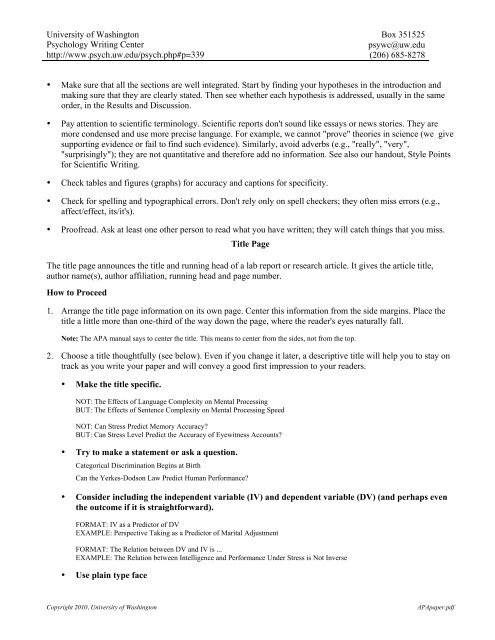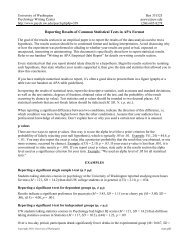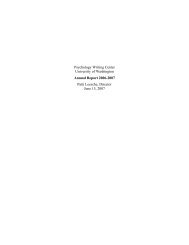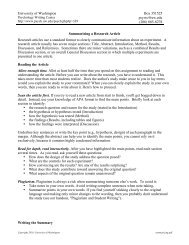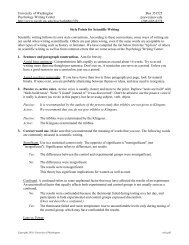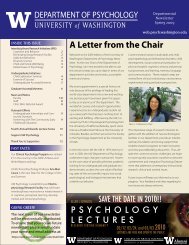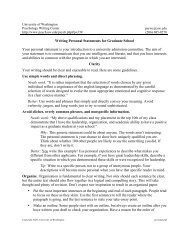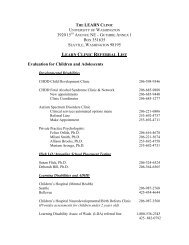Writing an Empirical Paper in APA Style - University of Washington ...
Writing an Empirical Paper in APA Style - University of Washington ...
Writing an Empirical Paper in APA Style - University of Washington ...
You also want an ePaper? Increase the reach of your titles
YUMPU automatically turns print PDFs into web optimized ePapers that Google loves.
<strong>University</strong> <strong>of</strong> Wash<strong>in</strong>gton<br />
Psychology <strong>Writ<strong>in</strong>g</strong> Center<br />
http://www.psych.uw.edu/psych.php#p=339<br />
Box 351525<br />
psywc@uw.edu<br />
(206) 685-8278<br />
• Make sure that all the sections are well <strong>in</strong>tegrated. Start by f<strong>in</strong>d<strong>in</strong>g your hypotheses <strong>in</strong> the <strong>in</strong>troduction <strong>an</strong>d<br />
mak<strong>in</strong>g sure that they are clearly stated. Then see whether each hypothesis is addressed, usually <strong>in</strong> the same<br />
order, <strong>in</strong> the Results <strong>an</strong>d Discussion.<br />
• Pay attention to scientific term<strong>in</strong>ology. Scientific reports don't sound like essays or news stories. They are<br />
more condensed <strong>an</strong>d use more precise l<strong>an</strong>guage. For example, we c<strong>an</strong>not "prove" theories <strong>in</strong> science (we give<br />
support<strong>in</strong>g evidence or fail to f<strong>in</strong>d such evidence). Similarly, avoid adverbs (e.g., "really", "very",<br />
"surpris<strong>in</strong>gly"); they are not qu<strong>an</strong>titative <strong>an</strong>d therefore add no <strong>in</strong>formation. See also our h<strong>an</strong>dout, <strong>Style</strong> Po<strong>in</strong>ts<br />
for Scientific <strong>Writ<strong>in</strong>g</strong>.<br />
• Check tables <strong>an</strong>d figures (graphs) for accuracy <strong>an</strong>d captions for specificity.<br />
• Check for spell<strong>in</strong>g <strong>an</strong>d typographical errors. Don't rely only on spell checkers; they <strong>of</strong>ten miss errors (e.g.,<br />
affect/effect, its/it's).<br />
• Pro<strong>of</strong>read. Ask at least one other person to read what you have written; they will catch th<strong>in</strong>gs that you miss.<br />
Title Page<br />
The title page <strong>an</strong>nounces the title <strong>an</strong>d runn<strong>in</strong>g head <strong>of</strong> a lab report or research article. It gives the article title,<br />
author name(s), author affiliation, runn<strong>in</strong>g head <strong>an</strong>d page number.<br />
How to Proceed<br />
1. Arr<strong>an</strong>ge the title page <strong>in</strong>formation on its own page. Center this <strong>in</strong>formation from the side marg<strong>in</strong>s. Place the<br />
title a little more th<strong>an</strong> one-third <strong>of</strong> the way down the page, where the reader's eyes naturally fall.<br />
Note: The <strong>APA</strong> m<strong>an</strong>ual says to center the title. This me<strong>an</strong>s to center from the sides, not from the top.<br />
2. Choose a title thoughtfully (see below). Even if you ch<strong>an</strong>ge it later, a descriptive title will help you to stay on<br />
track as you write your paper <strong>an</strong>d will convey a good first impression to your readers.<br />
• Make the title specific.<br />
NOT: The Effects <strong>of</strong> L<strong>an</strong>guage Complexity on Mental Process<strong>in</strong>g<br />
BUT: The Effects <strong>of</strong> Sentence Complexity on Mental Process<strong>in</strong>g Speed<br />
NOT: C<strong>an</strong> Stress Predict Memory Accuracy?<br />
BUT: C<strong>an</strong> Stress Level Predict the Accuracy <strong>of</strong> Eyewitness Accounts?<br />
• Try to make a statement or ask a question.<br />
Categorical Discrim<strong>in</strong>ation Beg<strong>in</strong>s at Birth<br />
C<strong>an</strong> the Yerkes-Dodson Law Predict Hum<strong>an</strong> Perform<strong>an</strong>ce?<br />
• Consider <strong>in</strong>clud<strong>in</strong>g the <strong>in</strong>dependent variable (IV) <strong>an</strong>d dependent variable (DV) (<strong>an</strong>d perhaps even<br />
the outcome if it is straightforward).<br />
FORMAT: IV as a Predictor <strong>of</strong> DV<br />
EXAMPLE: Perspective Tak<strong>in</strong>g as a Predictor <strong>of</strong> Marital Adjustment<br />
FORMAT: The Relation between DV <strong>an</strong>d IV is ...<br />
EXAMPLE: The Relation between Intelligence <strong>an</strong>d Perform<strong>an</strong>ce Under Stress is Not Inverse<br />
• Use pla<strong>in</strong> type face<br />
Copyright 2010, <strong>University</strong> <strong>of</strong> Wash<strong>in</strong>gton <strong>APA</strong>paper.pdf


